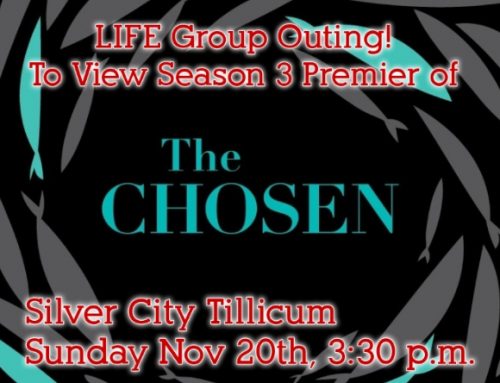You hear it all the time.
I’m done with church.
I don’t really need to go to church…my relationship with God is personal.
I’ve had it with organized religion.
The church is a man-made invention, not God’s idea.
I completely understand why a growing number of people are bailing on church. Even people who used to lead in the church often stop attending (here are 9 reasons why church leaders do that).
We’ve spent a lot of time working through the issue of declining church attendance (and growing disillusionment with the church) on this blog and in my leadership podcast.(For a summary of the issues, here’s a piece on the 10 reasons even committed church attenders are attending church less often).
I get it.
The church is far from perfect. Life is complex. There are growing options. And the post-modern mind distrusts most things organized or institutional.
But as trendy as the idea of writing off the church may be, it’s a mistake.
While writing off the church passes as sophisticated thinking, it’s actually the opposite; what if it’s a simplistic and even reductionistic line of thinking that leads nowhere constructive?
While writing off the church passes as sophisticated thinking, it’s actually the opposite.
The Church Isn’t Even Biblical, Is It?
People argue the idea of church isn’t even biblical.
So let’s start with the basics.
First if you’re a Christian, church is not something you go to. It’s something you are.
You can’t disassociate from church as a Christian anymore than you can disassociate from humanity as a person.
You don’t go to church. You are the church.
You don’t go to church. You are the church.
Second, the church was not a human invention. Half-reading the New Testament with one eye closed will still lead you to the inescapable conclusion that the church was God’s idea.
In fact, most of the New Testament is not about the teachings of Jesus. It’s about the work of the church that Jesus initiated and ordained. I won’t fill this post with scripture verses that prove my point, because, quite frankly, you’d have to get rid of the majority of the New Testament to argue that the church was a parenthetical, made-up organization.
If you want to get rid of the church, you also need to get rid of Jesus.
You can’t have one without the other.
If you want to get rid of the church, you also need to get rid of Jesus. He created it.
Maybe What Bothers You Should Actually Amaze You
I understand that the idea of the church being imperfect makes some people despair.
But rather than making us despair, the fact that Jesus started the church with imperfect people should make us marvel at God’s incredible grace.
That God would use ordinary, broken human beings as vessels of his grace, and delight in it is awe-inspiring. He’s proud of how his grace is beating through your imperfect-but-redeemed life and through the church (have you ever read Ephesians 3: 10-11?).
The idea that God would use you and me is pretty amazing. He had other options.
He could have spoken to the world directly, but instead chose to use broken people to showcase his grace to a world in need of redemption.
The idea that God would use you and me is pretty amazing. He had other options.
For sure, community is messy.
People sin. Leaders are sinful.
Most of the New Testament is not a story of an idealized church where everything worked perfectly all the time (just read 1 Corinthians any time you’re frustrated with your church).
Most of the New Testament is a story of Jesus using his followers to spread his love in spite of themselves and as they overcome obstacle after obstacle.
The fact that Christ uses flawed people to accomplish his work on earth is actually a sign of his grace, not a sign of his absence.
The church’s story, as twisted as it gets at times, is a beautiful story of God’s grace, God’s power and God’s redemption.
So, by the way, is your life, which reflects the story of the church more than you would want to admit.
The church gives the world a front row seat to the grace of God.
The church gives the world a front row seat to the grace of God.
The Ultimate Consumerism Isn’t Going To Church…It’s Walking Away From It
People criticize the church today as being consumeristic. And to some extent, churches cater to consumerism—often to our detriment. I agree that consumerism is a problem for Christianity.
But ironically, much of the dialogue about why people are done with church pushes people deeper into Christian consumerism than it pushes them into deeper discipleship: Here I am, all alone, worshipping God on my schedule when it’s convenient for me.
Listening to a podcast of your favourite preacher while you’re at the gym or on the back deck and pushing three of your favourite worship songs through your ear buds does not make you a more passionate Christ follower.
It usually makes you a less effective one.
Disconnecting yourself from community is actually less faithful than connecting yourself to a flawed community.
If you think the church today isn’t enough (and arguably, we need to reform it), then do what the early Christians did.
If you want a more biblical church…don’t gather weekly, gather daily. Before dawn.
Get up before the sun rises to pray together with other Christians before you go to work. Pool your possessions. Don’t claim anything as your own.
Be willing to lose your job, your home, your family and even your life because you follow Jesus.
Then you’ll be more authentic.
If you want a more biblical church, don’t gather weekly. Gather daily. Before dawn.
And notice that the early church did indeed gather.
Gathering always leads to some form of organizing.
To pretend the church doesn’t need to be organized is as logical arguing that society doesn’t need to be organized.
Because community is inevitable, organization is inevitable.
Because community is inevitable, organization is inevitable.
Our ability to organize and to accomplish more together than we can alone is one of the crowning achievements of humanity, and our ability to work together makes Christian effort far more effective.
It’s also part of God’s design for how we should interact while we’re on this planet. Come to think of it, heaven is a community too.
The only one who wants us to believe that we are better off alone is our enemy.
If you really think about it, it’s actually a very clever tactic.
The only one who wants Christians to believe we’re better off alone is our enemy.
The Church Has Helped Even Those Who Resent The Church
Finally, if you’re reading this article and you have any modicum of faith in Jesus, may I suggest your faith is actually the result of the mission of the church.
Very few people come to know Jesus because he appears to them supernaturally when they are alone and calls them by name.
Does that ever happen? Sure. But not to 99.9% of us.
Almost all of us who follow Jesus have had our lives changed by a flawed body called the church that Jesus so passionately loves and calls his own.
Think about that.
We Need More Church
Do we need more churches? Yes.
Do we need more humble churches? We do.
Do you we need authentic, transparent leadership? Absolutely.
Does the church need to change? Without a doubt.
The church needs continual reformation and transformation.
So what will the future look like?
Will we gather in quite the way we do today in the future? In some ways yes; in others, no.
Hopefully we gather more frequently and work through our differences at a deeper level and impact our communities more powerfully.
These two posts offer 10 predictions about future church attendance and 11 traits of churches that will impact the future.
But regardless of how the church gathers in the future, we will gather…we need to gather.
We Christians need each other, probably now more than ever.
And even if you don’t think you need other Christians, I promise you you do, and so does our world.
Now, more than ever, the world needs Christian working together humbly under Christ to lead people into a growing relationship with him, in whatever innovate and fresh forms that takes.
The church is not dead.
Far from it.
Maybe it’s just beginning to take shape for a brand new era that desperately needs it.





































































































































































































































































































